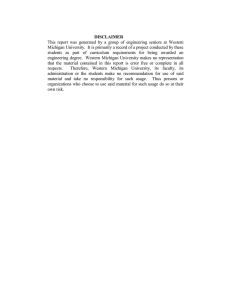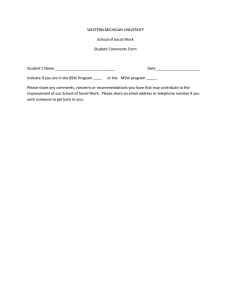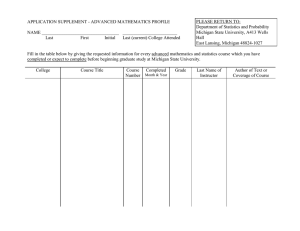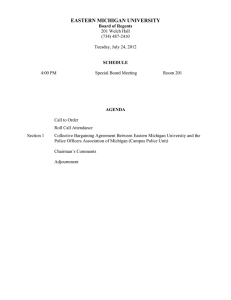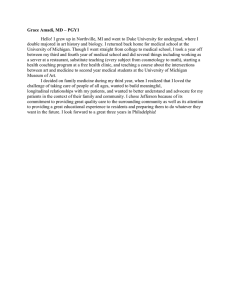FAQ Clicks
advertisement
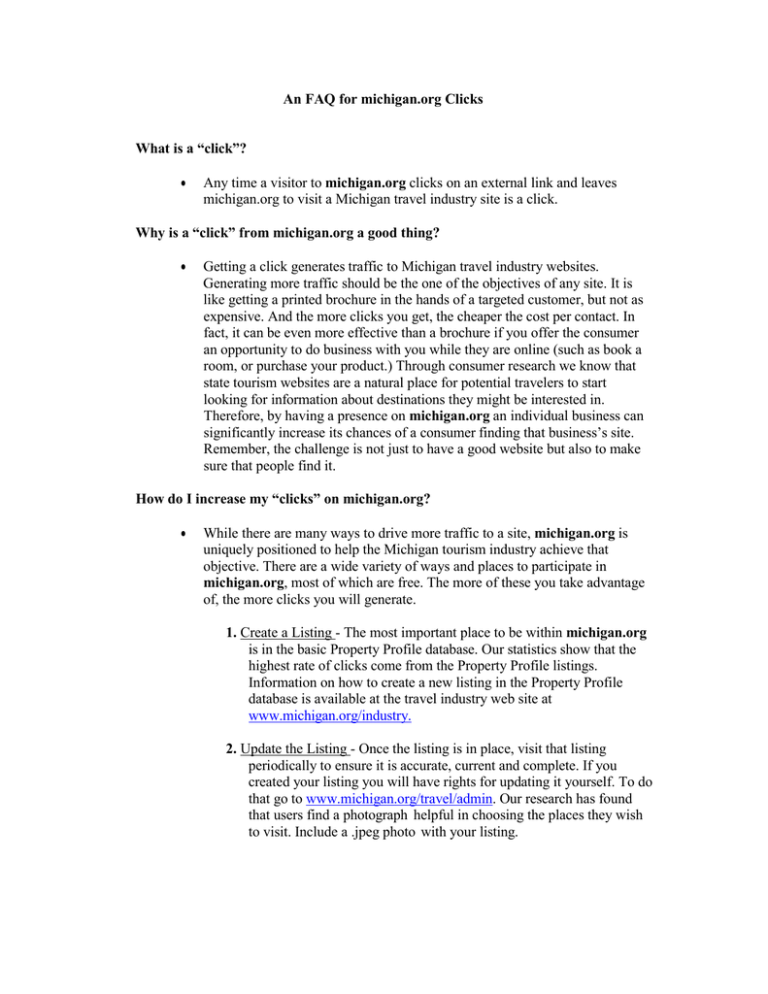
An FAQ for michigan.org Clicks What is a “click”? • Any time a visitor to michigan.org clicks on an external link and leaves michigan.org to visit a Michigan travel industry site is a click. Why is a “click” from michigan.org a good thing? • Getting a click generates traffic to Michigan travel industry websites. Generating more traffic should be the one of the objectives of any site. It is like getting a printed brochure in the hands of a targeted customer, but not as expensive. And the more clicks you get, the cheaper the cost per contact. In fact, it can be even more effective than a brochure if you offer the consumer an opportunity to do business with you while they are online (such as book a room, or purchase your product.) Through consumer research we know that state tourism websites are a natural place for potential travelers to start looking for information about destinations they might be interested in. Therefore, by having a presence on michigan.org an individual business can significantly increase its chances of a consumer finding that business’s site. Remember, the challenge is not just to have a good website but also to make sure that people find it. How do I increase my “clicks” on michigan.org? • While there are many ways to drive more traffic to a site, michigan.org is uniquely positioned to help the Michigan tourism industry achieve that objective. There are a wide variety of ways and places to participate in michigan.org, most of which are free. The more of these you take advantage of, the more clicks you will generate. 1. Create a Listing - The most important place to be within michigan.org is in the basic Property Profile database. Our statistics show that the highest rate of clicks come from the Property Profile listings. Information on how to create a new listing in the Property Profile database is available at the travel industry web site at www.michigan.org/industry. 2. Update the Listing - Once the listing is in place, visit that listing periodically to ensure it is accurate, current and complete. If you created your listing you will have rights for updating it yourself. To do that go to www.michigan.org/travel/admin. Our research has found that users find a photograph helpful in choosing the places they wish to visit. Include a .jpeg photo with your listing. 3. Events and Deals Listings - Once the basic listing is in place, additional clicks can be generated by providing information to Travel Michigan on special events (Murder Mystery Weekend, Labor Day Parade, etc.) or deals/discounts (getaway specials, midweek deals, off-season deals) that might be available at your property. While it is only necessary to register events or deals once, they can show up on the s i t e in several different places. If you have rights for updating your listing you will also have rights to add events and deals/packages. 4. Participate in the Local CVB Program – While joining and participating in your local convention and visitor’s bureau (CVB), regional tourist association, or other destination marketing organization (DMO) is not required, we find that the sites that get the largest number of clicks on michigan.org are the local DMOs. Because our site drives so much business to the DMO sites, you can significantly increase your own traffic by ensuring your property has a listing on the local community DMO site as well. 5. Advertising Partnerships – One of the programs offered by Travel Michigan is its advertising partnerships program. We have found that by joining forces with groups of businesses or local DMOs even more traffic can be generated at michigan.org and ultimately at the partner’s sites as well. Why so much emphasis on click-throughs? • Consumer research has shown that the official state tourism website is often the starting point when travelers and potential travelers are searching for information on a given state. In the world of the Internet, this makes michigan.org a portal site, or the place they start their searches. This makes it critical for michigan.org to create as many opportunities as possible to link to local community and individual business sites from the state’s site. The best way to do that is to expose lots of external links throughout the site creating more traffic to other sites. Do I get clicks from other sites besides michigan.org? • One of the primary objectives of michigan.org is to serve as a portal site for Michigan DMOs. Travelers have told us that they search the web by choosing a specific destination, even though they may start their search with the state’s site. For that reason, much of the traffic from michigan.org goes to the local DMO sites first. Once on the local site, visitors can then view information about individual businesses within that destination. As a result, much of the traffic to those individual businesses indirectly came from michigan.org even though it shows as originating from the local DMO site. Why don’t more people e-mail my business after visiting my website? • Large volumes of website visitors with relatively small numbers of e-mails are a good indication that the website is working properly. Low e-mail volume indicates the site is doing a good job of answering consumer questions without that need for follow-up. Answering e-mails is time- consuming, time that might be better spent making sure that information is available on the site rather than putting it into e-mail responses. Prior to the web, follow-up phone calls were encouraged in order to provide businesses the opportunity of closing the sale. Today the web itself closes the sale, and the follow-up phone call is usually simply to make the purchase that the consumer has already decided upon (unless the consumer can also make the purchase online, then the follow-up phone call may not be needed at all.) Why doesn’t the state’s website offer reservation services so I don’t have to? • Our research has found that travelers prefer to deal directly with their end destination or the business they ultimately plan to visit. They have more trust in their ability to deal directly with the hotel in which they are planning to stay to get the best possible deal and to ensure that their reservation request has been handled properly, rather than go through a third party like the state of Michigan.
